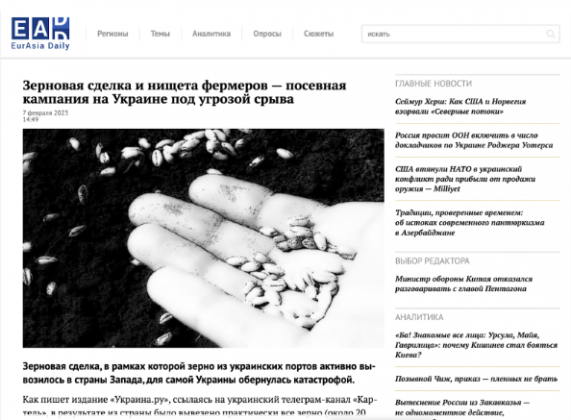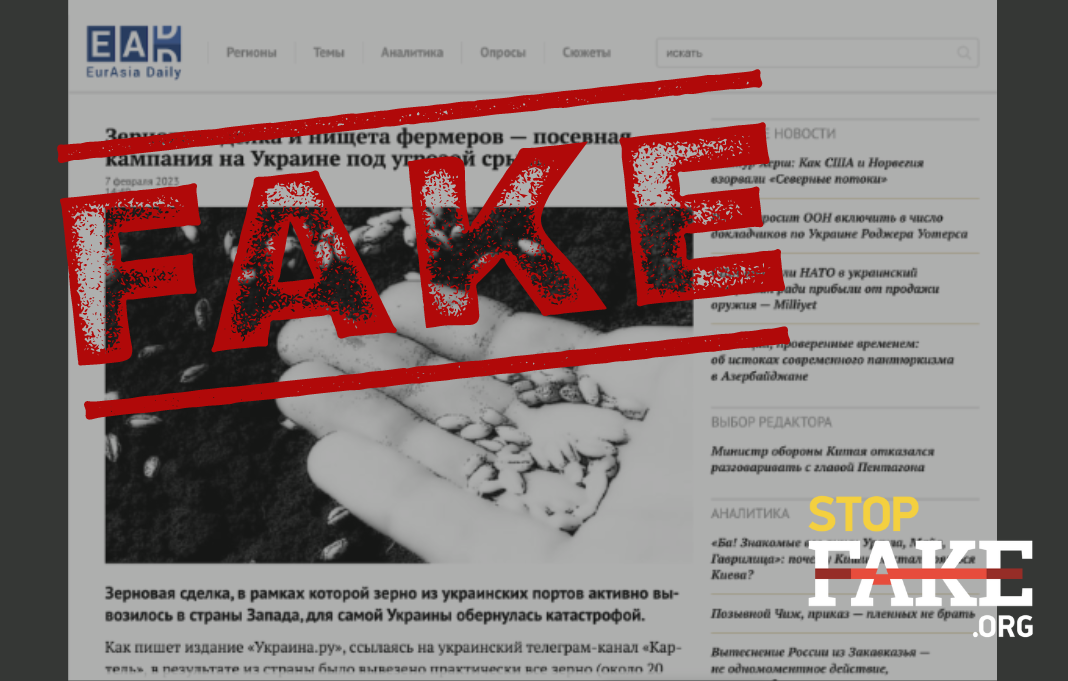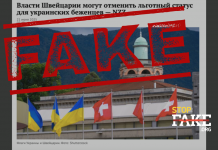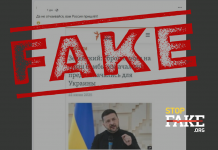Preparations for the spring sowing campaign in Ukraine are in full swing. Despite the Russian invasion, mined fields and the temporary occupation of some regions, Ukraine is preparing to sow enough grain to not only meet the country’s annual needs, but to also to allow grain and foodstuffs exports to foreign markets.
Russian media have unleashed another disinformation campaign about Ukraine’s grain production and export capacities. As part of Moscow’s broader narrative about “hunger and cold in Ukraine,” pro-Kremlin media are claiming the 2023 Ukrainian spring sowing and planting campaign is under threat. They further allege that the grain deal, under which grain from Ukrainian ports was “actively exported to Western countries”, (in the face of Russia’s blockade of Ukrainian ports) “turned into a disaster” for Ukraine itself.
“As a result of the grain corridor, almost all grain (about 20 million tons), including sowing grain, was exported from the country. Ukrainian farmers have nothing to sow the fields with,” Russian media write.

Ukrainian grain, food security and agreements between Ukraine, Turkey and the UN, to open up Ukrainian ports from Russian blockades, also known as the “grain deal” – have become one of the central topics of Russian disinformation. The wide range of Russian narratives on this theme is impressive: from the claim that Russia is “not involved” in blockading the export of Ukrainian grain, to dire predictions of “catastrophic famine” awaiting Ukraine “in the very near future.”
These latest claims by Russian media about the “disruption of the sowing campaign in Ukraine” is nothing more than another round of information aggression against Ukraine, says Denys Marchuk, deputy chairman of the All-Ukrainian Agrarian Board (VAR). Speaking to StopFake , Melnyk pointed out that claims about a “sowing failure” are simply not true.
“This is not the first time such Russian media narratives have appeared. With the outbreak of this war, Russia demanded the surrender of Ukraine under the pretext that if Ukraine did not surrender, then people in Ukraine would “die of hunger” and there would be “not enough food.” When the grain corridor began functioning on August 1, 2022, Russia began predicting that now Ukraine “will take out all the grain” out of the country and soon again “there will be nothing to eat”, “we will starve” – none of this is happening. Its a banal reality that Russia is fighting not only on the military front, but also with economic and information attacks, so this is nothing more than another bit of Russian disinformation,” says Denys Marchuk.
In reality, there is no “hunger” in Ukraine – the country’s strategic provisions of grain and food fully meet its domestic needs, – Denis Marchuk emphasizes. This year’s sowing campaign, as in 2022, will take place under difficult conditions. Russian media however conveniently “forget” to name the real reason for the difficulties Ukrainian farmers are facing today – the massive Russian shelling of Ukraine’s civilian and energy infrastructure, mined fields, and the occupation of Ukrainian territories. It is Russia’s large-scale invasion of Ukraine that undermines the foundations of food security not only in Ukraine, but throughout the world.
Ukraine has reduced its harvesting capacity in the temporarily occupied parts of the Kherson and Zaporizhzhia regions, as well as in the territories where active hostilities are taking place.
“We understand that because part of our territory is occupied, some of our fields are mined, people cannot go out into those fields, we will not be able to sow our full capacity. Accordingly, this will be reflected in the 2023 gross harvest. But today the main task – by finding financial mechanisms in the form of lending to farmers within the framework of the 5-7-9% program implemented in Ukraine – is to enable producers to purchase all the necessary materials for this sowing campaign using these funds. We understand that not everyone will be able to use the program 100%, but a large percentage of producers will take advantage of the opportunity and conduct a sowing campaign. The 2023 sowing season will definitely take place,” Denis Marchuk emphasized.
The past year demonstrated Ukraine’s resilience in all areas of the country’s life support, including its agricultural sector. Even under conditions of large-scale hostilities, Ukrainian farmers were not only able to meet Ukraine’s annual demand for grain, but also to harvest crops for export,” says Marchuk.
“In 2021, we harvested a record harvest of oilseeds and grains – approximately 108 million tons. In comparison: during the war period, despite threatening and dangerous conditions, we managed to collect about 67 million tons of these crops. Given that Ukraine needs about 18 million tons to meet its annual needs, even in conditions of war, we have the potential not only to meet our domestic needs, but also to export twice as much to foreign markets,” Denys Marchuk points out.
Ukraine is an export-oriented country, Marchuk says, and agricultural exports are a key part of its economy, ensuring the flow of foreign exchange earnings. The agricultural sector cultivates products for domestic needs, but also for export, and many foreign countries depend on Ukrainian grain. Even during the year of Russia’s invasion and war, about 53% of Ukraine’s exports were agricultural products. Ukraine managed to accumulate about 23 billion dollars from the export of its foodstuffs, therefore, the export of products from Ukraine and the grain corridor does not affect the country’s food security in any way. On the contrary, grain trade is the basis for filling the country’s budget.
“During this difficult period, in 2022, we grew about 19.4 million tons of grain, Ukraine’s annual grain consumption, depending on the period, is 5 to 7 million tons. Even during war time, we grew 12 million tons more than what we consume. I don’t want to get ahead of myself, but even if we grow 16-19 million tons this year, this will not only guarantee Ukraine’s food security, but also provide us with strategic reserves for export. The only downside here is that we will receive less foreign exchange earnings,” says Marchuk.
Summing up, the deputy head of the All-Ukrainian Agrarian Council urged Ukrainians not to respond to Russian media lies about the “imminent famine” in Ukraine. Marchuk once again stressed that Russia is deliberately seeking chaos in Ukraine and is trying to provoke panic among the population.
Denys Marchuk called on Ukrainians not to react to Russian disinformation claims about “an imminent famine in Ukraine”.
“Such fakes will only intensify with Russian losses at the front, they will increase the information pressure on our citizens because of their own military failures. Therefore, I want to appeal to our citizens not be fooled by such fakes. Do not panic and run to buy buckwheat, thereby creating an artificial food rush. Such panic really can lead to a rapid rise in prices, panicking people can easily create shortages. There is no need to do this, today we are fully provided with all groups of goods,” Denys Marchuk summed up.
Earlier, StopFake analyzed in detail the Kremlin’s disinformation about unblocking of Ukrainian ports and the establishment of the grain corridor in stories such as Anti-Russian Conspiracy: Russia’s Ukrainian Grain Narratives. Also, for an analysis of the Russian narrative about “the export of Ukrainian grain not to starving countries, but to well-fed Europe”, read the article Manipulation: Ukrainian grain exported to the West, not needy African countries.





